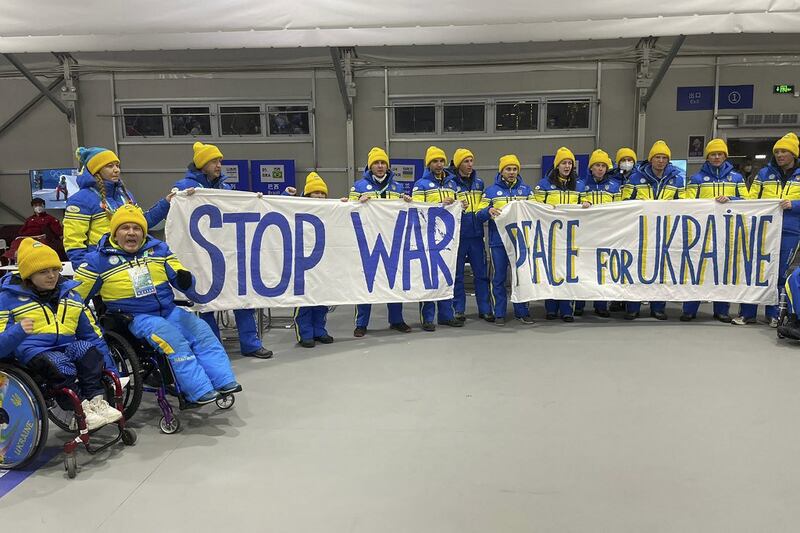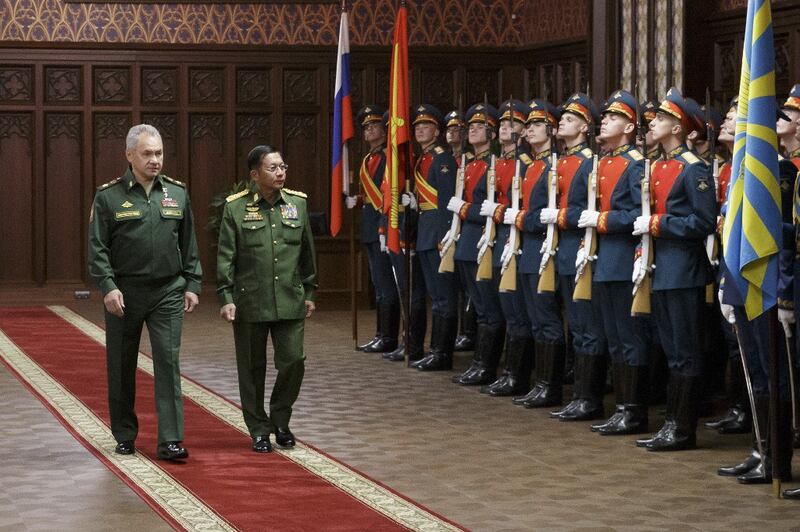Russia’s invasion of Ukraine is being portrayed in varying ways by news outlets serving nearly two billion readers in East and Southeast Asia. Chinese media are offering Moscow-friendly coverage and censoring the rest, while some of its more democratic neighbors are delivering balanced and occasionally pro-Ukraine reporting.
Over the past week, RFA and affiliated BenarNews surveyed news media coverage of the crisis in the countries we cover that run the gamut from Marxist-Leninist governments in China, Vietnam, North Korea and Laos, to more liberal countries in Southeast Asia, where audiences often sample news media that would be familiar to people in the West. Those countries are carrying international wire reports and hosting lively debate. They also focus on the plight of their expatriates living and working in Ukraine.
Predictably, the region’s more authoritarian nations have much more controlled messaging, reflecting historic ties between Moscow and its Communist friends in Asia - apparent at this week’s UN General Assembly 141-5 vote in favor of condemning the invasion of Ukraine, where China, Laos and Vietnam all abstained. North Korea, which has the most closed media of any nation in the world, voted against the U.N. measure and has been mostly silent on Ukraine.
Here is a quick look at the region's media coverage of the war. Countries are listed along with their ranking in the annual World Press Freedom Index by the France-based watchdog Reporters Without Borders. (For reference, the index ranks Ukraine at 97 out of 180 countries, while Russia is at 150).

China 177/180
Chinese state media have struggled like the government that controls and directs them to reconcile widening gaps between the official line that stops short of calling the Russian campaign an invasion and the fast unfolding horrors being inflicted on the people in Ukraine by Russian forces.
State media have been using a lot of content from Russian media reports, to the point that "official media have pretty much become the mouthpiece of the Russian media,” said Renmin University journalism graduate Lu Nan.
He told RFA the CCP's shadowy "public opinion management" operations were encouraging pro-Russian comments on social media, while comments critical of Moscow get censored swiftly.
"They only allow one voice to exist, so all of the comments are supportive of Putin," Lu said. "No dissenting voices are allowed to appear."
State media propaganda sits uneasily with a tide of social media reports from Chinese on the ground in Ukraine including students begging to be evacuated amid shelling by Russian forces.
Vietnam (175/180)
Vietnamese media are covering the conflict in great detail. While much of the coverage is pro-Moscow, there is less pro-Russia bias than when Russia annexed Crimea in 2014.
Nhan Dan daily, the mouthpiece of Vietnam’s ruling Communist Party, reported both sides’ arguments at Tuesday’s United Nations Security Council’s emergency meeting on Ukraine. It carried quotes by not only the Russian and Chinese representatives but also by the U.S. ambassador to the U.N. and a statement from the Ukrainian president.
The official Vietnam News Agency’s online newspaper, Bao Tin Tuc, while dedicating most space to the Russian accounts of the crisis, also reported on the West’s condemnation of Russian President Vladimir Putin’s recognition of the two breakaway regions in eastern Ukraine, as well as the European sanctions against Moscow.
Laos (172/180)
Mainstream media in Laos is state-run, and the sparse coverage it has of the Ukraine conflict leans heavily on the Chinese state news agency, Xinhua, which in turns leans heavily on Russia’s view of events.
A March 3 headline in the Vientiane Times reads: “Fighting continues as Russia’s ‘special military operation’ in Ukraine has entered the seventh day, while a new round of peace talks is reportedly to take place.” The same report gives most prominence to a quote from the Russian Defense Minister Sergei Shoigu who vows to continue the military operation in Ukraine until achieving the main goal of “defending Russia from Western threats.”

Myanmar (140/180 before the Feb. 1, 2021 military coup)
Military junta-controlled state media favor Russia. It is one of the few countries to support the military regime that ousted an elected government a year ago. Moscow has continued to sell arms to the junta despite widespread atrocities.
The Myanmar state newspapers cover the Ukraine crisis by printing translated stories directly from Russia’s TASS news agencies and China’s CGTN news, while pro-military nationalists’ accounts on Telegram clearly side with Russia.
The Burmese language Kye Mon newspaper reminded readers that Ukraine was part of Soviet Union and appeared to draw a link with the situation at home, warning against allowing disintegration of multi-ethnic Myanmar and to prevent outside interference. An editorial last week in the Burmese-language Myanmar Alin also called for building a strong military in order to be respected by neighbors.
But private media have carried international wire services and presented the conflict as the result of a Russian invasion. Anti-junta outlets operating in exile took a largely pro-Ukraine stance.
Cambodia (144/180)
The state news agency Agence Kampuchea Presse, or AKP, has carried brief news about Russian leaders and the sanctions they now face, based on translations from Xinhua and TASS. AKP reports do not portray Russia as the aggressor and do not provide details of death and destruction in Ukraine.
Pro-government Fresh News has focused on sanctions against Russia from the West and Russian reactions.
The pro-government outlet DAP has published articles and news supporting the Russian invasion as an act of self-defense, and blaming the West for provoking the war to enlarge its influence.
Some private outlets are carrying international media reports of the conflict.
Indonesia (113/180)
Most media in Indonesia have relied on international wire services including Agence France-Presse, the Associated Press and Reuters for reporting on the Russian invasion of Ukraine.
One news website RMOL.id posted an interview with the Ukrainian ambassador to Indonesia, Vasyl Hamianin, where he began by saying: “It’s extremely worrying. Russian President Vladimir Putin’s ambition and obsession with invading Ukraine has brought Muslim societies in both countries into conflict.”
During the interview, Hamianin accused Russia of pitting Muslims against each other by sending Chechen fighters to Ukraine.
While Muslims total only about 1 percent of Ukraine’s population, Crimea, which is internationally recognized as part of Ukraine, account for 15 percent of the population.
Indonesia is the world’s most populous Muslim-majority nation.
Malaysia (119/180)
The Malaysian government has refrained from using the word “invasion,” referring to the current situation as “intensifying conflict in Ukraine” while urging the two nations to find peace without specifically naming Russia.
But upcoming local elections in one of Malaysia’s largest states is drawing more attention from local media than what is being called the Russia-Ukraine crisis – where reporting leans pro-Ukraine.
Much of the reporting is focusing on how the crisis has impacted on the Malaysian economy in the form of price hikes for gasoline and other goods.
Bangladesh (152/180)
Ukraine reporting tops the front pages of Bangladesh newspapers while private TV channels host analysts to discuss the Russian invasion and air reports released by global media including BBC, CNN, and Al Jazeera. Overall, the media coverage is balanced while the analysts offer varied opinions, mostly critical of the invasion.
“Bangladesh media is mainly presenting the war facts and casualties, which is not sufficient in wartime reporting, I think. The media should be more reflective of anti-war sentiments and presenting human angle stories,” media analyst Faruq Faisel, regional director for South Asia and Bangladesh of the rights group Article 19, told BenarNews.
Bangladesh media has reported on efforts to return Bangladeshi expatriates who were stuck inside Ukraine or fled into its neighboring countries. Other reporting focused on analysts expressing fear that potential sanctions against Russia could negatively affect construction of the Russian-built Rooppur nuclear power plant, one of the nation’s largest development projects.
The Philippines (138/180)
Philippine media coverage of the conflict in Ukraine has been muted and has dealt with efforts to bring home about 350 Filipino migrant workers.
Stories are playing on foreign news pages as Page One reporting has focused on the May 9 presidential election even as candidates have spoken about Russia and Ukraine.
Of particular concern is how the ongoing invasion would affect the economy because pump prices have gone up.
Thailand 137/180
Thai media’s foreign news sections have been flooded with coverage of the Russian invasion of Ukraine, largely based on reports or analysis from foreign news agencies. Global English news channels, like BBC, CNN, Al Jazeera, Russia’s RT, and China’s CCTV can be watched only on pay TV. Many people get access via YouTube.
Official information is coming out of the Thai Embassy in Warsaw, Poland, which also is responsible for the evacuation of some 255 Thais working in the service sector in Ukraine. Thirty-eight arrived back home on Wednesday.
The Thai government, known for ‘bending with the wind’ on foreign policy, failed to condemn Russia for the invasion. It has been noted and criticized by some in the local media for taking a “neutral” stance, as government officials have avoided the word “invasion,” and largely confined their remarks to the economic fallout, including on gas prices and tourism.
Reporting by RFA's Khmer, Lao, Mandarin, Myanmar, and Vietnamese Services, and Pimuk Rakkanam, Subel Rai Bhandari, Richel V. Umel, Froilan Gallardo, and Muzliza Mustafa for BenarNews. Written by Paul Eckert.
